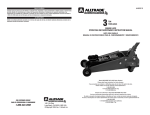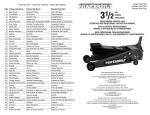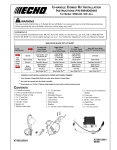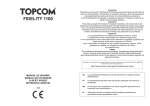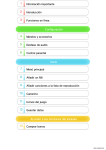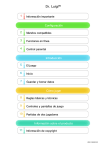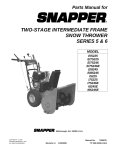Download 640818 PB 2T LoProJck IM 2
Transcript
Model / Modelo / Modèle #640818 2 TON TONELADAS LOW PROFILE GARAGE JACK OPERATING AND MAINTENANCE INSTRUCTION MANUAL GATO PARA GARAJE DE PERFIL BAJO MANUAL DE INSTRUCCIONES PARA EL FUNCIONAMIENTO Y MANTENIMIENTO Meets ANSI/ASME PALD-2003 Safety Standard Please retain these instructions for future reference. If you encounter any problems or difficulties please do not return this jack to the store. Please contact our toll free customer service department at: 1-800-423-3598 1-310-522-9008 (California only) 1-310-522-9066 Fax FOR CUSTOMER SERVICE PARA EL SERVICIOPARA EL CONSUMIDOR 1-800-423-3598 1431 Via Plata Long Beach, CA 90810-1462 ©Copyright 2006 POWERBUILT. Rev.1 Cumple con las Normas de Seguridad ANSI/ASME PALD-2003 Por favor, guarde estas instrucciones para que le sirvan de referencia en el futuro. Si usted se encuentra con algún problema o dificultad, por favor, no dude en devolver este gato al negocio. Por favor, comuníquese con nuestro departamento de servicios para el consumidor, de forma gratuita llamando al: 1-800-423-3598 1-310-522-9008 (solamente para California) 1-310-522-9066 - Fax SPECIFICATIONS Rated Capacity (Safe Working Load) Weight Lowered Height Maximum Height 2 Ton (4000 LB) (1814 KG) 75.9 LB (34.4 KG) 3-1/2" (9 cm) 21-1/4" (54 cm) Capacidad Calificada (Carga de trabajo segura) Peso Altura baja Altura máxima 2 Toneladas (4000 LB) (1814 KG) 75.9 LB (34.4 KG) 3-1/2" (9 cm) 21-1/4" (54 cm) PARTS LIST • LISTA DE PIEZAS No. Handle Socket Dado de la Manija Saddle Asiento Lift Arm Brazo Elevador Yoke Balancín Handle Socket Screw Tornillo del Dado de la Manija Lift Arm Linkage Unión del Brazo Elevador Front Wheel Rueda Delantera Handle Manija Ram (Not Shown) Embolo (No se Demuestra) Rear Caster Inclinación Posterior 2 TON LOW PROFILE PROFESSIONAL SERVICE JACK WARNING • • • • • • • • • STUDY, UNDERSTAND, AND FOLLOW ALL INSTRUCTIONS BEFORE OPERATING THIS DEVICE. DO NOT EXCEED RATED CAPACITY USE ONLY ON HARD LEVEL SURFACE LIFTING DEVICE ONLY. IMMEDIATELY AFTER LIFTING. SUPPORT THE VEHICLE WITH APPROPRIATE MEANS FAILURE TO HEED THESE MARKINGS MAY RESULT IN PERSONAL INJURY AND/OR PROPERTY DAMAGE LIFT ONLY ON AREAS OF THE VEHICLE AS SPECIFIED BY THE VEHICLE MANUFACTURER NO ALTERATIONS SHALL BE MADE TO THIS PRODUCT ONLY ATTACHMENTS AND/OR ADAPTERS SUPPLIED BY THE MANUFACTURER SHALL BE USED DO NOT MOVE OR DOLLEY THE VEHICLE WHILE ON THE JACK 2 Description Descripción Qty. 1 Front Wheel Axle Eje, Rueda Delantera 1 2 Front Wheel Rueda Delantera 1 3 Washer Arandela 2 4 Screws M12 Tornillos M12 2 5 Screws M8 Tornillos M8 2 6 Left Side Plate Placa Izquierda 1 7 Washer Arandela 4 8 Screws M12 Tornillos M12 4 9 Caster Assembly Unidad de Ruedecilla 2 10 Screws M8 Tornillos M8 4 11 Screws M6 Tornillos M6 4 12 Washer Arandela 2 13 Screws M18 Tornillos M18 2 14 Washer Arandela 2 15 Locking Nut Contratuerca 2 16 Returning Spring Muelle de Retorno 2 17 Ram Assembly Conjunto del Ariete 1 18 Block Link (ram) Eslabón de Bloqueo (ariete) 1 19 Cotter Pin Pasador de Chavetas 1 20 Roll Pin Pasador de Rodillo 1 21 Bolt Perno 1 22 Yoke Eje del Rodillo del Bombeador 1 23 Upper Handle Manija Superior 1 24 Bolt M6 Perno M6 1 25 Lower Handle Manija Inferior 1 26 Inspection Plate Placa de inspección 1 27 C-Ring Anillo en C 2 28 Bushing Buje 2 29 Strut Puntal de Suspensión 1 30 Shaft Arm Brazo del Mango 1 31 Right Side Plate Placa Derecha 1 32 Linkage Bolt Perno de Unión 2 33 Washer Arandela 1 34 Nut M12 Tuerca M12 2 35 Saddle Asiento 1 36 Saddle Center Bolt Perno Central del Soporte 1 37 Long Linkage Unión Larga 2 38 C-Ring Anillo en C 2 39 Saddle Platform Strut Arandela 12 1 11 YOKE RETAINING WIRE REMOVAL Your jack has been shipped with a retaining wire to hold the yoke in the downward position. This must be removed. CAUTION: RETAINING WIRE UNDER LOAD AND COULD SNAP OFF AND CAUSE PERSONAL OR PROPERTY DAMAGE. WEAR EYE PROTECTION AND GLOVES TO REMOVE. Push down on the yoke until the hook portion of the wire retainer can be removed from the handle socket or frame reinforcing strut. A second person may be needed to hold the front of the jack down while applying downward force to the yoke. Remove the wire and allow the yoke to raise to it’s upper resting position. OWNER AN/OR OPERATOR RESPONSIBILITY It is the owner and/or operators responsibility to read and understand all WARNINGS , operating, and maintenance instructions contained on the product label and instruction manual prior to operation of this unit. It is also the owner and/or operators responsibility to provide maintenance, maintain all decals or warning labels and in general while in use, maintain the unit in good working order. If the owner and/or operator is not fluent in English, French or Spanish, the product warnings and instructions shall be read to and discussed with the operator in the operator’s native language by the purchaser/owner or his designee, making sure that the operator comprehends its contents. ASSEMBLY INSTRUCTIONS REMOCIÓN DEL CABLE DE RETENCIÓN DE LA HORQUILLA Su gato ha sido enviado con un cable de retención para sostener la horquilla hacia abajo. Este tiene que quitarse. PRECAUCIÓN: EL CABLE DE RETENCIÓN DEBAJO DE LA CARGA PODRÍA SOLTARSE Y OCASIONAR DAÑOS PERSONALES O A LA PROPIEDAD. USE PROTECCIÓN OCULAR Y GUANTES PARA QUITARLO. Empuje la horquilla hacia abajo hasta que la porción del gancho del retén del cable pueda quitarse del dado del mango o de la viga de refuerzo del marco. Es posible que se necesite una segunda persona para sostener la parte de adelante del gato hacia abajo mientras se hace fuerza hacia abajo en la horquilla. Quite el cable y permita que la horquilla se levante hasta alcanzar su posición original superior. This jack is completely assembled except for the handle. For removal of the yoke retaining block: slide lower section of handle into handle socket part ways making sure handle does not bind against handle socket screw. Move handle and yoke in downward direction relieving pressure off yoke retaining block. Romove retaining block 1. Assemble handle by unscrewing bolt from lower handle section and inserting top handle section. 2. Align bolt holes of both handle sections and tighten handle bolt using 10mm wrench. 3. Move handle foam pad over bolt. CAUTION: RETAINING BLOCK UNDER LOAD 4. Apply small amount of grease to handle socket. AND COULD SNAP OFF AND CAUSE PERSONAL 5. Place the assembled handle into the handle socket. OR PROPERTY DAMAGE. WEAR EYE PROTEC6. Tighten the handle socket screw. TION AND GLOVES TO REMOVE OPERATING INSTRUCTIONS Before use, a visual inspection of the jack should be made looking for bent, worn or loose parts, or hydraulic leaks. If any of these conditions exist, the jack should be removed from service. JACK USE 1. Make sure the jack and the vehicle are on a hard level surface. 2. Always set the vehicle parking brake and block the wheels. 3. Consult the vehicle owners manual to ascertain the location of jack points and position the jack beneath the prescribed lift point. 4. Turn the handle clockwise to closed position. Do not over tighten! 5. Pump the handle and raise the vehicle to the desired height. 6. Place jack stands beneath the vehicle at locations recommended by the vehicle manufacturer, and do not get under the vehicle without jack stands, as jacks are not designed to maintain these heavy loads for long time periods. 7. Turn handle slowly counterclockwise to lower load onto jack stands. LOWERING THE VEHICLE 1. 2. 3. 4. Turn handle clockwise to closed position. Pump handle to lift vehicle off of jack stands Remove jack stands. Do not get under or let anyone else under the vehicle. Turn handle SLOWLY counterclockwise to lower the vehicle onto the ground. JACK STORAGE Always store your jack in the fully lowered position. This will prevent critical areas from excessive corrosion. MAINTENANCE Monthly maintenance is recommended. Lubrication is critical to jacks as they support heavy loads. Any restriction due to dirt, rust, etc., can cause either slow movement or cause extremely rapid jerks, damaging the internal components. The following steps are those designed to keep the jack well lubed: 1. Lubricate the ram, linkages, saddle and pump mechanism with light oil. Grease wheel bearings and axles. 10 3 2. Visually inspect for cracked welds, bent, loose, missing parts or hydraulic oil leaks. 3. If jack is subjected to abnormal load or shock, remove from service and have it examined by an Authorized Repair Service. 4. Clean all surfaces and maintain all labels and warnings. 5. Check and maintain the ram oil level. 2. Con el gato en posición vertical, quite el tapón del aceite. El aceite debe estar parejo con el orificio del fondo. Si no lo está, llénelo. No lo llene demasiado. Llene siempre con un aceite para gatos hidráulicos limpio y nuevo. 3. Vuelva a colocar el tapón de carga. 4. Inspeccione el funcionamiento del gato. En este momento, consulte con la sección de Resolución de Problemas para la Liberación del Sistema de Aire. CHECKING OIL LEVEL RESOLUCIÓN DE PROBLEMAS Do not use brake or transmission fluids, or regular motor oil as they can damage the seals. Always purchase and use products labeled Hydraulic Jack Oil. 1. Turn handle counterclockwise to allow ram to fully retract. It may be necessary to apply force to the saddle for lowering. 2. With jack in upright position remove oil fill plug. Oil should be even with bottom of hole. If not, top up. Do not overfill. Always fill with new, clean hydraulic jack oil. 3. Replace fill plug. 4. Check jack operation. At this time, consult Troubleshooting section for System Air Purge. TROUBLE SHOOTING System Air Purge 1. Turn handle counterclockwise one full turn to open. 2. Pump handle eight full strokes. 3. Turn handle clockwise to close valve. 4. Pump handle until the lift arm reaches maximum height and continue to pump several times to remove trapped air in the ram. 5. Turn handle counterclockwise one full turn and lower lift arm to the lowest position. Use force if necessary. 6. Turn handle clockwise to closed position and check for proper pump action. It may be necessary to perform the above more than once to assure air is evacuated totally. OTHER SYMPTOMS PROBLEM Jack will not lift to full height: Jack will not hold load: Lift arm will not lower: Jack feels spongy when lifting: POSSIBLE CAUSE Low oil level Release valve not closing Hydraulic jack oil contaminated Pump valves not sealing Cylinder ram binding Parts worn Internal damage Broken return spring or unhooked Lift arm linkage bent or binding See Air Purge section ACTION Check oil level Call customer service Call customer service Any hydraulic jack found to be damaged in any way, is found to be worn or operates abnormally “SHALL BE REMOVED FROM SERVICE UNTIL REPAIRED”. Owners and/or operators should be aware that repair of the equipment requires specialized knowledge and facilities. Only factory authorized parts, labels and decals shall be used on this equipment. Call the customer service department. 4 OTROS SÍNTOMAS PROBLEMA El gato no se levanta hasta la altura completa El gato no sostiene la carga CAUSA POSIBLE Nivel de aceite bajo PROBLEMA El brazo de elevación no baja CAUSA POSIBLE El émbolo del cilindro está unido Piezas gastadas Daño interno Resorte de retorno roto o desenganchado La unión del brazo elevador está doblado o unido. Vea la sección de Purga de aire El gato aparenta estar esponjoso al levantar La válvula de liberación no cerró Aceite del gato hidráulico contaminado Las válvulas de la bomba no están sellando MEDIDAS Inspeccione el nivel de accite Llame al servicio para los consumidoress MEDIDAS Llame al servicio para los consumidoress Vea el procedimiento para liberar el aire SERVICIO DE FABRICA See air purge procedure FACTORY SERVICE ALTERATIONS Purgado del Sistema de Aire 1. Haga girar la manija en sentido contrario al que giran las manecillas del reloj una vuelta completa para abrirla. 2. Bombee la manija ocho veces . 3. Para cerrar la válvula haga girar la manija en el mismo sentido que giran las manecillas del reloj. 4. Bombee la manija hasta que el brazo de elevación alcance la altura máxima y continúe bombeando varias veces para quitar el aire que se encuentra atrapado en el émbolo. 5. Haga girar la manija en sentido contrario al que giran las manecillas del reloj una vuelta completa y baje el brazo elevador hasta la posición más baja. Haga fuerza si fuera necesario. 6. Haga girar la manija en el mismo sentido que giran las manecillas del reloj hasta la posición cerrada y verifique que la acción de bombeo sea la adecuada. Podrá ser necesario hacer lo indicado anteriormente más de una vez para asegurarse de que el aire ha sido completamente evacuado. Cualquier gato hidráulico que se compruebe que está dañado o gastado de algún modo o que funciona anormalmente “DEBERÁ SER QUITADO DE SERVICIO HASTA HABER SIDO REPARADO”. Los propietarios y/o operarios deberán estar conscientes que para reparar el equipo se necesita conocimientos e instalaciones especializadas. Solomente las piezas, etiquetas y calcomanfas de fábrica autorizadas deberán ser utilizadas para este equipo. Llame al departamento de servicios para el comsumidor. ALTERACIONES Debido a los peligros potenciales asociados con el mal uso de equipo de este tipo, no deberán realizarse alteraciones al producto sin la autorización escrita del fabricante o proveedor. 9 INSTRUCCIONES PARA EL FUNCIONAMIENTO Antes de utilizarlo, se deberá realizar una inspección visual del gato para buscar piezas dobladas, gastadas o flojas o pérdidas hidráulicas. Si existiera alguna de estas condiciones deberá quitar el gato de servicio. USO DEL GATO 1. Asegúrese de que el gato y el vehículo se encuentren en una superficie dura y nivelada. 2. Coloque siempre el freno de mano del vehículo y bloquee las ruedas. 3. Asegúrese de que no haya ningún obstáculo en la trayectoria para las ruedas del gato, ya que estas se mueven durante el proceso de levantamiento. 4. Haga girar la manija en el mismo sentido que giran las manecillas del reloj hasta la posición cerrada. ¡No ajuste demasiado! 5. Bombee la manija y eleve el vehículo hasta la altura deseada. 6. Coloque las bases del gato debajo del vehículo en los lugares recomendados por el fabricante del vehículo y no vaya debajo del vehículo sin que las bases del gato estén en su lugar, ya que los gatos no han sido diseãdos para mantener estas cargas pesadas durante largos períodos de tiempo. 7. Haga girar la manija en sentido contrario al que giran las manecillas del reloj para bajar la cargo hasta las bases del gato. Because of the potential hazards associated with the misuse of equipment of this type, no alterations shall be made to the product without written authorization of the manufacturer or supplier. GATO PARA GARAJE DE PERFIL BAJO DE 2 TONELADAS ADVERTENCIA • ESTUDIE, COMPRENDA Y RESPETE TODAS LAS INSTRUCCIONES ANTES DE PONER EN FUNCIONAMIENTO A ESTE DISPOSITIVO. • NO EXCEDA LA CAPACIDAD CALIFICADA • UTILICE SOLAMENTE SOBRE UNA SUPERFICIE DURA Y NIVELADA • DISPOSITIVO DE ELEVACIÓN SOLAMENTE. INMEDIATAMENTE DESPUÉS DE ELEVAR, APOYE EL VEHÍCULO CONFORME A LOS MEDIOS ADECUADOS. • SI NO RESPETA ESTAS INDICACIONES PODRÍA RESULTAR EN LESIONES PERSONALES Y/O EN DAÑOS A LA PROPIEDAD. • ELEVE SOLAMENTE EN LAS ÁREAS DEL VEHÍCULO CONFORME A LO ESPECIFICADO POR EL FABRICANTE DEL VEHÍCULO. • NO SE LE DEBERÁN HACER ALTERACIONES A ESTE PRODUCTO • DEBERÁN UTILIZARSE SOLAMENTE AQUELLOS ACCESORIOS Y/O ADAPTADORES SUMINISTRADOS POR EL FABRICANTE • NO MUEVA NI AGITE EL VEHÍCULO MIENTRAS ESTÉ EN LA GATA MODO DE BAJAR EL VEHÍCULO 1. 2. 3. 4. Haga girar la manija en el mismo sentido que giran las manecillas del reloj hasta la posición cerrada. Bombee la manija para elevar el vehículo de las bases del gato. Quite las bases del gato. No se coloque debajo del vehículo ni permita que nadie lo haga. Haga girar la manija LENTAMENTE en sentido contrario al que giran las manecillas del reloj para bajar el vehículo hasta el piso. ALMACENAMIENTO DEL GATO Almacene su gato siempre en posición completamente descendida. Esto evitará que zonas importantes se oxiden excesivamente. MANTENIMIENTO Se recomienda el mantenimiento mensual. La lubricación es de suma importancia para los gatos, ya que soportan cargas esadas y cualquier restricción ocasionada por suciedad, oxidación, etc. puede causar, ya sea un movimiento lento o saltos extremadamente rápidos, dañando los componentes internos. Los siguientes pasos son los designados para mantener al gato bien lubricado: 1. Lubrique el ariete, uniones, asientos y el mecanismo de bombeo con aceite liviano. Engrase los conjinetes de la ruedas y ejes. 2. Inspeccione visualmente de soldaduras agrietadas, piezas dobladas, sueltas o que faltan, o pérdidas de aceite hidráulico. 3. Si al gato se lo somete a cargas anormales o choques, deje de utilizarlo y hágalo examinar por un Servicio de Reparaciones Autorizado. 4. Limpie todas las superficies y mantenga todas las etiquetas y advertencias. 5. Inspeccione y mantenga el nivel de aceite del ariete. MODO DE INSPECCIONAR EL NIVEL DE ACEITE ADVERTENCIA No utilice líquido para frenos ni para transmisión ni tampoco aceite para motores, ya que los mismos pueden dañar las juntas. Compre y use siempre los productos etiquetados Aceite para Gatos Hidráulicos. 1. Haga girar la válvula de liberación en sentido contrario al que giran las manecillas del reloj para permitir que el ariete se retraiga completamente. Puede ser necesario hacerle fuerza al asiento para bajarlo. 8 RESPONSABILIDAD DEL DUEÑO Y/O OPERARIO El propietario y/o los operarios tienen la responsabilidad de leer y comprender todas las ADVERTENCIAS y las instrucciones acera del funcionamiento y mantenimiento incluidas en la etiqueta del producto y en el manual de instrucciones antes de poner a funcionar esta herramienta. El propietario y/o operario es responsable además, de proporcionar el mantenimiento, de mantener todas las calcomanías o etiquetas con advertencia y, en general, mientras se lo está utilizando, mantener la unidad en buenas condiciones de funcionamiento. Si el propietario y/o el operador no habla inglés, francés o español, el comprador/propietario del producto o su designatario deberá leerle al operario las advertencias e instrucciones del producto en el idioma original en el que dicho operario hable, asegurándose de que dicho operario entienda su contenido. INSTRUCCIONES PARA ARMAR Este gato está completamente armado excepto la manija. Se proporciona una almohadilla de protección de espuma para evitar el daño accidental al vehículo debido a la manija. Para quitar el eje que sostiene la corredera del bloque: hacer descender la sección de la manija en el casquillo de la manija parcialmente asegurándose de que la manija no se una contra el tornillo del casquillo de la manija. Mover la manija y el eje en dirección hacia abajo aliviando la presión que sostiene el bloque. Destornillar el tornillo del casquillo de la manija y quitar el bloque que sostiene el eje. 1. Armar la manija destornillando el perno de la sección inferior de la manija y colocando la sección superior de la manija. 2. Alinear los orificios del perno de ambas secciones de la manija y ajustar el perno de la manija utilizando una llave de 10 mm. Precaución: El bloque de 3. Mover la almohadilla de espuma de la manija por encima del perno. 4. Aplicar una pequeña cantidad de grasa al casquillo de la manija. retención debajo de la carga 5. Colocar la manija armada en el casquillo de la manija podría destrabarse y causar 6. Ajustar el tornillo del casquillo de la manija. 5 lesiones personales o daños materiales. Use protección ocular y guantes para retirarlo 6 7







